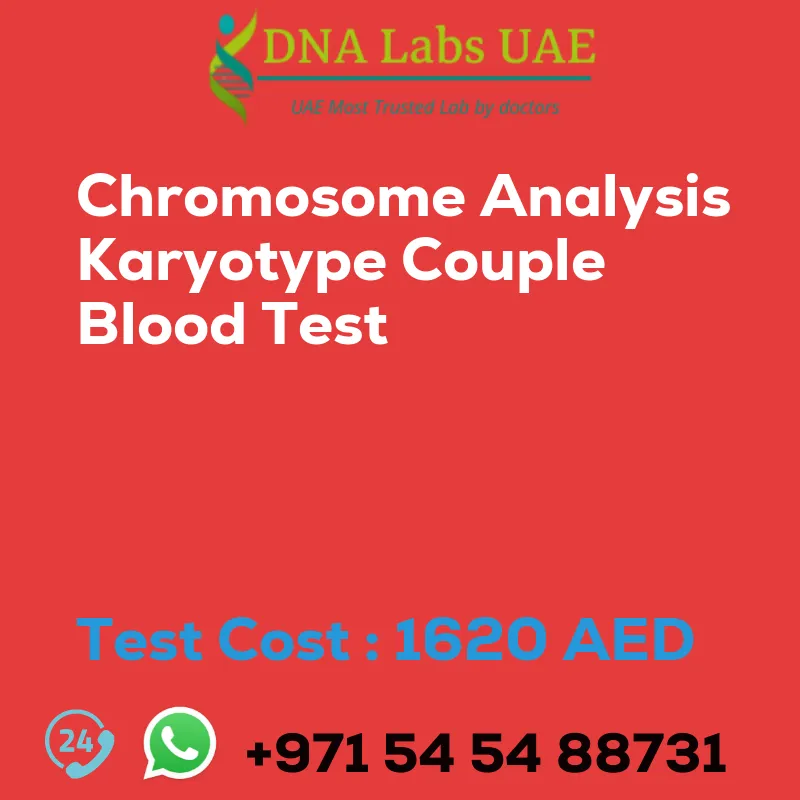Chromosome Analysis Karyotype Couple Blood Test
Test Name: CHROMOSOME ANALYSIS KARYOTYPE COUPLE BLOOD Test
Components: Blood samples from husband and wife
Price: 1620.0 AED
Sample Condition: 5mL (3 mL min.) whole blood in 2 Green Top (Sodium Heparin) tubes each from husband and wife. Ship refrigerated immediately. DO NOT FREEZE. Specimen should reach LPL, New Delhi within 24 hrs. Duly filled Chromosome & FISH Analysis Requisition form (Form 17) is mandatory.
Report Delivery: Sample daily by 4 pm; Report within 12 working days
Method: Culture, Robotic Microscopy, Karyotyping
Test Type: Genetic Disorders
Doctor: Gynecologist
Test Department: CYTOGENETICS
Pre Test Information: Duly filled Chromosome & FISH Analysis Requisition form (Form 17) is mandatory.
What is Chromosome Analysis Karyotype Couple Blood Test?
Chromosome analysis, also known as karyotyping, is a laboratory test used to analyze the number and structure of chromosomes in a person’s cells. This test can be performed on blood samples from individuals to detect any abnormalities or genetic disorders.
In the context of a couple blood test, chromosome analysis can be done to identify any potential genetic issues that may affect their ability to conceive or carry a healthy pregnancy. It can help determine if either partner has chromosomal abnormalities that could be passed on to their children.
How is the Test Performed?
The process involves collecting blood samples from both partners and isolating the white blood cells. These cells are then stimulated to divide, and the chromosomes are stained and examined under a microscope. The chromosomes are arranged in pairs according to their size, shape, and banding patterns to create a visual representation called a karyotype.
The karyotype can reveal any numerical abnormalities (such as an extra or missing chromosome) or structural abnormalities (such as translocations or deletions) that may be present. These abnormalities can affect fertility, increase the risk of miscarriage, or cause genetic disorders in offspring.
Importance of Chromosome Analysis Karyotype Couple Blood Test
By analyzing the karyotypes of both partners, healthcare professionals can provide information about the couple’s reproductive health and potential risks. Based on the results, they may recommend further genetic counseling or additional tests to assess the risk of passing on any genetic conditions to their children.
It is important to note that chromosome analysis is just one component of a comprehensive fertility evaluation. Other factors, such as hormone levels, semen analysis, and medical history, should also be considered to assess overall fertility potential.
| Test Name | CHROMOSOME ANALYSIS KARYOTYPE COUPLE BLOOD Test |
|---|---|
| Components | |
| Price | 1620.0 AED |
| Sample Condition | 5mL (3 mL min.) whole blood in 2 Green Top (Sodium Heparin) tubes each from husband and wife. Ship refrigerated immediately. DO NOT FREEZE. Specimen should reach LPL, New Delhi within 24 hrs. Duly filledChromosome & FISH Analysis Requisition form (Form 17) is mandatory. |
| Report Delivery | Sample Daily by 4 pm;Report 12 Working days |
| Method | Culture,Robotic Microscopy,Karyotyping |
| Test type | Genetic Disorders |
| Doctor | Gynecologist |
| Test Department: | CYTOGENETICS |
| Pre Test Information | Duly filledChromosome & FISH Analysis Requisition form (Form 17) is mandatory. |
| Test Details |
Chromosome analysis, also known as karyotyping, is a laboratory test used to analyze the number and structure of chromosomes in a person’s cells. This test can be performed on blood samples from individuals to detect any abnormalities or genetic disorders. In the context of a couple blood test, chromosome analysis can be done to identify any potential genetic issues that may affect their ability to conceive or carry a healthy pregnancy. It can help determine if either partner has chromosomal abnormalities that could be passed on to their children. The process involves collecting blood samples from both partners and isolating the white blood cells. These cells are then stimulated to divide, and the chromosomes are stained and examined under a microscope. The chromosomes are arranged in pairs according to their size, shape, and banding patterns to create a visual representation called a karyotype. The karyotype can reveal any numerical abnormalities (such as an extra or missing chromosome) or structural abnormalities (such as translocations or deletions) that may be present. These abnormalities can affect fertility, increase the risk of miscarriage, or cause genetic disorders in offspring. By analyzing the karyotypes of both partners, healthcare professionals can provide information about the couple’s reproductive health and potential risks. Based on the results, they may recommend further genetic counseling or additional tests to assess the risk of passing on any genetic conditions to their children. It is important to note that chromosome analysis is just one component of a comprehensive fertility evaluation. Other factors, such as hormone levels, semen analysis, and medical history, should also be considered to assess overall fertility potential. |








